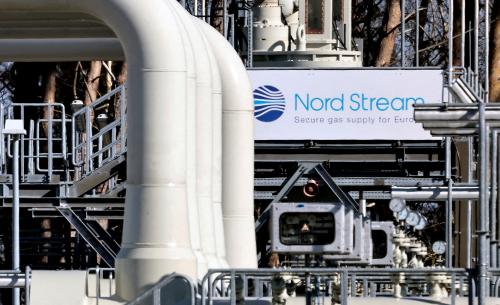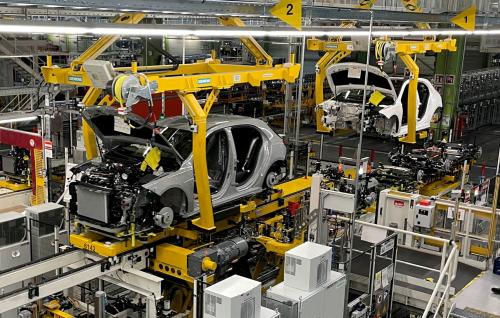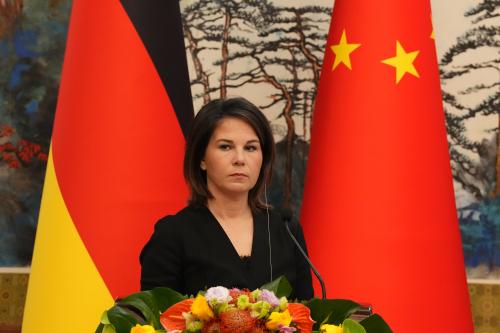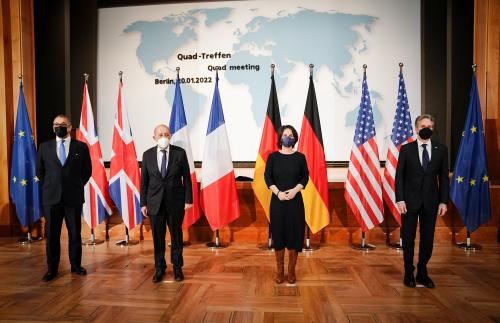After the Russian invasion of Ukraine, there was a heated debate in Germany about whether to embargo the import of Russian natural gas as a sanction against Russia’s aggression. Germany imported 55% of its gas from Russia at the time, and many argued that the embargo would crush Germany’s economy. Before Germany could act, Russian began cutting the flow of gas to Germany, eventually halting it entirely. A new BPEA paper studied the effects of this abrupt change and found that the consequences were not as dire as many experts feared it would be. On this episode of the Brookings Podcast on Economic Activity, paper authors Benjamin Moll and Georg Zachmann talk with Economic Studies Director Ben Harris about how Germany navigated this tense situation, as well as their prior work that helped spur the “Great German Gas Debate.”
- Listen to the Brookings Podcast on Economic Activity on Apple, Spotify, or wherever you like to get podcasts.
- Learn about other Brookings podcasts from the Brookings Podcast Network.
- Sign up for the podcasts newsletter for occasional updates on featured episodes and new shows.
- Send feedback email to [email protected].
TRANSCRIPT
[00:00:00]
[music]
EBERLY: I’m Jan Eberly, James R. and Helen D. Russell Professor of Finance at Northwestern University.
STEINSSON: And I’m Jón Steinsson, Chancellor’s Professor of Economics at the University of California, Berkeley.
EBERLY: We’re the coeditors of the Brookings Papers on Economic Activity, a semiannual academic conference and journal that pairs rigorous research with real time policy analysis to address the most urgent economic challenges of the day.
STEINSSON: And this is the Brookings Podcast on Economic Activity, where we share conversations with leading economists on the research they do and how it will affect economic policy.
[00:00:43]
On this episode, the vice president and director of the Brookings Economic Studies Program, Ben Harris, interviews Benjamin Moll, professor of economics at the London School of Economics, and Georg Zachmann, a senior fellow at Bruegel.
Ben and Georg, along with Moritz Schularick of the Kiel Institute for the World Economy, are coauthors of a new BPEA paper titled “The Power of Substitution: The Great German Gas Debate in Retrospect.”
EBERLY: So, Jón, we’ve wanted to discuss these issues at BPEA for quite a while, but last year has really been a laboratory for the question of how changes in global energy markets could affect an economy. As the data have come in following the great German gas debate, it was a chance to learn what would actually happen when such a shock occurred.
STEINSSON: Yeah, the backstory for this paper is really fascinating. Back in 2022, very soon after the invasion of Ukraine by Russia, Moll, Schularick, and a number of coauthors put out a paper arguing that the cost to Germany of stopping all gas imports from Russia immediately was, quote unquote, “substantial but manageable.”
Their analysis really received a lot of attention and sparked a very heated debate in Germany. The business lobby in particular predicted that stopping gas imports cold turkey would be ruinous for the German economy. However, in the summer of 2022, the Nord Stream One gas pipeline from Russia to Germany was blown up. So Germany was forced to stop importing gas from Russia.
EBERLY: So with the decision taken out of policymakers hands, everyone got busy finding other alternatives, economizing on energy use, and of course, hoping for some good luck, which seemed to come in the form of a mild winter. So what surprised you about the actual outcomes, Jón?
STEINSSON: I remember thinking back in ‘22 that Moll and Schularick’s predictions were pretty bold and I was worried that they would turn out to be wrong. After all, oil shocks have in the past been very costly and contributed to substantial recessions.
But as it turned out, they seem to have been quite correct. It’s really an important example, I think, of how careful analysis of the details of a policy situation can lead to conclusions that are better grounded than people’s casual fears about the situation.
[music]
But let me now hand it over to Ben, Benjamin and Georg.
[00:03:16]
HARRIS: Thank you, Jón and Jan. I’m Ben Harris, vice president and director of Brookings Economic Studies Program. Joining me today is Benjamin Moll of the London School of Economics and Georg Zachmann of Bruegel. Thank you, Ben and Georg, for joining me today, and welcome.
So let’s start with some background on the subject of your paper. I think our listeners are familiar with the Russian invasion of Ukraine and that it had a major impact on global supply chains, including those for energy. But your paper focuses on Germany, which faced a unique dilemma when the invasion began. In early 2022, Germany imported 55% of its natural gas from Russia. After the invasion, this resulted in an energy crisis when that supply was cut off. You call the resulting debate around the economic costs of the cutoff “the great German gas debate.” Could you share a little more about the background on this debate and what was involved?
[00:04:09]
ZACHMANN: I would start out by looking slightly back to already summer 2021. So to say that German dependency on Russian gas has been indeed, as you say, massive. And Russia started to exploit that from the summer already by reducing gas flows to Europe and to not filling its storages in in Germany. Gazprom owned significant storage capacities in in the European Union at the time.
And by the start of the year of the war, European storages, especially German ones and especially those owned by Gazprom, they are close to empty, implying a very dire outlook for the security of supply.
That however, we managed relatively well, despite the fact that Russia over the first six months of the war was the player that extorted it’s potential to put pressure on Europe. So they stopped gas flows to Poland. They stopped gas flows to Bulgaria. They at some moments stopped gas flows to Germany in summer 2022. So we have to be very sure to highlight that it was the Russian actions in the European gas market that put up the pressure and not any policies from the European side.
[00:05:24]
MOLL: Yeah. So let me add to that. So, as you heard, these numbers were really staggeringly large. So this dependency. And so then basically straight after the invasion in February 2022, this pretty big debate in Germany started about potentially embargoing Russian energy imports, or alternatively what would be the cost if the Russians cut off the gas, because that was always on the horizon and that’s what ultimately happened as well.
And pretty quickly, both industry CEOs and politicians started painting pretty apocalyptic scenarios. So in the beginning of our paper, we have this quote from the CEO of BASF, which is the largest chemical company in the world, which is a German chemical company, and they were usually dependent on Russian gas. And a gentleman in a newspaper interview where he was asked about an embargo, he said, do we knowingly want to destroy our entire economy? And he said this would result in the biggest crisis since World War II. Politicians would say the lights will go out. Mass unemployment and poverty was another term that was used.
[00:06:28]
And so we basically got into this debate. We put together a team of some energy economists, microeconomists, macroeconomists, to think this through with some data and some modeling. And we came out with costs that would be substantial but not as catastrophic. So 1 to 3% GDP loss relative to if the gas continued to flow. And the words we always used were “substantial but manageable.”
And this then set off this debate which went pretty high up. At some point, the German chancellor went after us on TV, which was interesting, criticizing our irresponsible use of mathematical models and so on. And then also because the German government, as Georg said, was so afraid of these costs, there was no embargo from the German side.
But, at some point the gas stopped flowing, nevertheless. And in particular, it was the Russians that weaponized these gas supplies. And then at some point in September of 2022, I guess someone actually blew up one of the big pipelines that was going from Russia to Germany to Nord Stream pipelines, which was this very visual description of these gas flows stopping. And then we could see what happened after that.
[00:07:39]
HARRIS: Thank you. That’s really helpful background.
So let’s get into the findings of your paper. And so, one of the key findings was that the effect of the Russia gas embargo on German GDP. And so those who argued against an embargo cited that it could lead to a severe recession and a 6 to 12% decline in GDP, as you just noted. That there was one view that this would be catastrophic. Instead, as you just laid out, you found that Germany’s economy merely suffered a mini recession with GDP dropping by 0.5% during the last winter, which was in line with your prediction of a 1 to 3% GDP drop relative to a no cutoff scenario.
So can you just give a bit more details and explain a bit more about how Germany managed to avoid a more severe crisis, despite this major energy shock?
[00:08:30]
MOLL: Sure. Absolutely. Just to be clear, obviously this did have substantial costs and obviously Germany is facing substantial headwinds. So, you know, all is not amazing with Germany. But at the same time, as you said, catastrophic scenarios didn’t materialize.
And the way this happened, we really saw two key margins of adjustment. The first one was that Germany managed to replace a fair chunk of this Russian gas with imports from other countries. So, third countries other than Russia, say from Norway—imports from Norway increased a lot—but also liquefied natural gas. So LNG in particular from the from the United States, which was imported not via LNG terminals in Germany originally at least, but through the Netherlands, say, and Belgium. So that was sort of on the supply side.
And then we also saw a large adjustment on the demand side. So in particular, German gas demand decreased by a staggering 20%, which is a really large number. And in particular for industry, gas demand by industry decreased by more than a quarter, so 26% since the gas cutoff in the fall of last year. Households a little less, but still 17%, which is a substantial number.
[00:09:47]
And where it’s particularly interesting, we think is for industry. So the original scenarios were always that there would be these cascading effects was the word people used along the supply chains whereby, say the chemicals industry would use to import all this gas. Now they don’t have this gas anymore. Now a chemicals industry can’t produce chemicals anymore that you then use to produce plastic, then you can’t produce packaging anymore, and sort of just unravels along the entire supply chain. And there were like similar lots of similar stories like this where you got these sort of catastrophic scenarios because the entire supply chain got knocked out.
And that was something we didn’t see at all, basically. So instead what we saw was that in some sectors where they did use a lot of gas, there were originally very large drops in industrial production, say, in the chemicals industry or say in the glass sector. But these then didn’t have these knock on effects. Instead, what you saw is that imports increased a lot of these gas intensive imports, gas intensive goods, for example, or that you switched to other energy sources to produce these goods. So to say you use oil to heat your blast furnace rather than gas.
So you saw a lot of sort of adaptation, substitution, exactly what you would expect if there’s a lot of money on a line and you have profit maximizing businesses. They’re going to figure out a way to do it differently.
[00:11:09]
HARRIS: Were you surprised by the speed of the adjustment? I mean, you guys address this in your paper, which is this principle that the amount of time that economies have to adjust matters, and that adjustment tends to happen over time that the economy has more room to adapt. This struck me as an incredibly fast adjustment, both in terms of the household adjustment and on the industrial side. And maybe the answer was that there were opportunities for adjustment that were already in place. And you guys do a great job in your paper of talking about the role of trade, the role of LNG, and other things. But overall, were you surprised by how quickly Germany adjusted to the shock?
[00:11:52]
MOLL: Yeah. I think where I was personally surprised was the adjustment and substitution on the supply side so that they managed to get so much gas from third countries other than Russia. Georg is the gas market specialist. He may disagree. Were you surprised by that as well?
ZACHMANN: We had at the end of 2021 a first policy briefing when we saw this crisis on the horizon where we essentially said this could be the options and that could be done within 2022 if something were to happen. And we pretty much lined out some of those options.
But the one thing is having the options and the other thing is being able to really develop them quickly. And something that typically puts a lot of sand into the gearbox is that people do not feel the prices immediately because they have hedged contracts for longer periods of time, because government arrangements essentially protect them and therefore they don’t see the need to act fast enough.
But here, seemingly the feeling was pretty clear to all the actors that the this thing is there to stay. The massive increase in prices last year, and we have to highlight that, so prices increased more than tenfold for natural gas. Probably conveyed very clearly the message to all market actors that now is the time to act and we really should get going very, very quickly.
And a fascinating thing is that prices are now down a lot. So we are currently at prices that are maybe two or three times higher than before the crisis, but not at all at the prices we saw at the middle of last year.
[00:13:22]
MOLL: Let me just jump back in and come back to your original question. So the other part of my answer was going to be that on the demand side, I don’t think it was that surprising in particular, given the large price movements that Georg just said. So it was really just econ 101 in action. Prices go up, people cut their demand and substitute. And if the prices go up enough, then then people are going to do other things and substitute. So it’s really just saying demand curves are downward sloping if you want.
And I guess we had done in our original paper, we had looked at sort of estimates of these elasticities of demand in the literature, and they were all very low, but not zero. And so we fed those into our model. And then what we saw happening was exactly the kind of adjustment you’d think you’d see if you just let the prices move enough, then people in households would move like this and would adjust like this.
And as Georg said, we did have a follow up paper to our original paper in August of last year where we spelled out exactly where we think the adjustment would happen. So this was prior to Russia completely cutting the gas off, but what was already on the horizon. And our numbers were actually pretty close to what you saw happening. So we, I think, had industry dropping their consumption by 25% and households by 17%, and then said was 26% and 17%. So pretty close to that. And so, yeah, sometimes basic economics works well, I would say. And these quantitative macro models that we have, they’re useful for something.
[00:14:49]
ZACHMANN: Basic economics works if the political economy allows for that. And maybe that has been the most surprising thing from the crisis is that the European markets held, so that all major actors allowed markets to perform the task of rationing demand and pulling in supply to have these very high prices. We had very strong discussions throughout last year about rationing. We had discussions about member states potentially closing borders to other member states. And if that would have happened, then we would have been in a very, very different picture.
And I think here policymakers did some right steps, like jointly agreeing that all member states have to reduce demand even so some member states were not dependent on Russian gas. And that helped to keep the markets open, helped to keep the markets alive. And that essentially unleashed these substitution effects that Ben lined out.
[00:15:43]
HARRIS: And so, Ben used a phrase which I think is key to your paper, which was “low but not zero elasticity of substitution is key.” And let’s get to that in one second. But just stay on the point that we’re talking about. I’m curious what role you think patriotic behavior had in this or if this would have been any different had it not been associated with a war. So I went to the Baltic States and Poland in January of this year. I was sent there by the Biden administration to help establish the price caps on refined product.
And one thing I was struck by when I was in the Baltic states was this sense of conservation in the name of solidarity with Ukraine. And so you’d go to government buildings and the heat would be turned way down. And they’re very proud of this. And they would say, you know, can you take the stairs rather than the elevator? We don’t want to use the extra energy. Or you would look up at the ceiling and there would be three light bulbs, but only one would be plugged in. So it seemed to be this wasn’t just about a response to a price increase, but also felt like it was actions centered around solidarity with Ukraine. Did you get a sense of that? Or do you think that it was mostly just a response to higher prices?
[00:16:55]
MOLL: So, yeah, I think there’s definitely some truth to what you’re saying. Empirically it’s pretty hard to separate the two. But, it’s true what Georg is saying, that in particular for households, a lot of the households didn’t feel the price increases as much. Spot market prices increased by a factor of ten or something. The household prices increased by much less, maybe doubled. And lots of households who were in long term contracts didn’t feel these.
But still, I think some of these households—probably now as the new data is coming in, we may be able to study this—you’ll probably see that some of these households also cut their demand. Some of them maybe for solidarity with Ukraine. Don’t think solidarity with Ukraine was as large in Germany as in, say, Poland. But that probably plays a role. But then also just this idea that we need to get through the winter jointly. And this was definitely very much sort of messaged on TV. The European Union had a campaign—sort of save gas for a safe winter, and so on. So this was very much if you switched on the TV, this was a very salient thing. So I think that definitely played a role.
[00:18:00]
ZACHMANN: On the empirical point that it’s difficult to disentangle. I mean, it challenges a bit that those countries that are closer to Russia are typically also more solidaric with Ukraine. But they also saw the biggest supply cuts from Russia and therefore saved more. So you see a line, you see that the those countries that are more solidaric with Ukraine are saving more gas. But you cannot really distinguish it from the fact that those countries are also typically the countries that have had to cut more because they obtained more gas from Russia. So it’s empirically pretty difficult, but hopefully we’ll get better data over time.
[00:18:32]
HARRIS: I think you guys chose the perfect title for your paper, which is “the power of substitution,” which just feels like this is a case study in the power of substitution. I think the central finding your paper was that a low, but nonzero elasticity of substitution was critical in seeing these rather muted macroeconomic effects. Can you talk a little bit more about that given how central that finding was to your efforts here?
[00:18:58]
MOLL: Yeah, absolutely. So, yeah, this is really also some basic economics that you can teach through to undergrads nicely. So if you don’t have any substitutability—so in the economics terminology for this is I guess is if production is Leontief or perfect complement. So every technology you have uses one unit of gas, two units of iron ore, and so on, and you can’t ship these things around at all, then what you will get, and it’s pretty easy to see, is that if gas supply falls by 20% in a production process, then it will take down the entire production by 20%. And so everything falls one for one.
And then if you have that going on along the entire supply chain, then what you will get is that everything falls by 20%. So you have this one small input. It could be even smaller and less important than gas, and it will fall by 20%. And then because it’s this extreme bottleneck, it takes down everything. So that’s the sort of cascading effect doomsday scenario that the industry CEOs and so on were painting.
[00:20:02]
But then the basic realization is, well, that’s not quite how the world works. So in particular, there are some little margins of adjustment everywhere along the way. And then the point is, as soon as you have a little bit of adjustment or substitutability, I guess is the right word, as parameterized in economics by these elasticities of substitution. And so if say those elasticities are 0.05 rather than 0, which sounds like that would give you very similar results, the answer is that doesn’t give you very similar results, instead it gives you much, much smaller economic losses.
And the thing is, is that once you substitute a little bit, intuitively you basically overcome this extreme bottleneck property of the small input that’s gas. So that’s kind of how it works intuitively.
[00:20:46]
HARRIS: And in your paper you find that going from 0 to 0.05 on the elasticity of substitution means that the output reductions go from 20% to less than 3%. And so this is just so central to your finding that a little bit of substitutability matters a ton in the macro output. I thought it was just a really interesting case study in that.
Can we talk a little bit about geopolitical implications of your study? So for Germany, you write that their failure to implement sanctions quickly represents a major missed opportunity to stand up to Russian President Vladimir Putin and to help avert enormous human suffering in Ukraine. So what lesson should other federal governments, potentially even here in21:33] the U.S., take away from this conclusion?
[00:21:33]
ZACHMANN: I would zoom out, again, a bit, on what to do before such an incident occurs, because I think that is part of the problem that we have seen in Germany. So we did not monitor our dependencies objectively, so we did not see the concentration of individual suppliers. And in natural gas, we’ve had 55%, but we’ve had just to open Nord Stream 2, which would have brought us quite easily to more than two-thirds of our gas supplied from just one country.
We did not monitor potentially our substitution possibilities which led to these discussions that we had in 2022. So we have no understanding in the oil sector, in the chemical sector to which degree inputs could be substituted.
So here there was really a lack also of knowledge infrastructure on our end. And in the discussions we are currently perpetuating in Europe about strategic autonomy, I think a big part of the discussion is about how can we better monitor our dependencies and which degree of dependencies we can accept.
[00:22:39]
Now the second point is that we need a plan for such situations and we need to have better planning. We had a lack of administrative capacities in Germany in the crisis. We think we saw the crisis coming from summer 2021 on and there was no special task force in the ministries or so that at least were visible to us that we are discussing what is coming and how to properly prepare for that. And if you are fearing that your entire economy goes down the drain because of that, you probably should bring together the best minds with the best data to prepare for that.
[00:23:12]
And then what in my view is very much needed is to really tap into the elasticities not only in your own country but also in your neighboring countries. And I think that is what happened eventually, because markets were open, very importantly in the internal market in Europe. I think the European internal market helped a lot to save Germany, because without the gas flows through Belgium, through the Netherlands, the flows even from France, it would have been extremely more difficult, substantially more difficult for Germany, they would have had to reduce their gas consumption much more than they had to.
And the same holds for the global markets. Global markets, global LNG markets with their flexibility and their players helped quite a bit. But it required importing infrastructure that Germany was not willing to invest into before the war. And that has had massive costs that could have been avoided.
[00:24:02]
MOLL: Let me also jump in with one more thing. So I guess probably a lot of your listeners are in the U.S. And so I guess one debate this is obviously relevant to is this whole China de-risking discussion, or suppose China invades Taiwan and we’re discussing the economic implications of that. So what would be the cost of embargos or if China blockades the Taiwan Strait and so on?
And I don’t think we can conclude somehow from this that the costs of such a conflict or less trade with China would be small. But I think what’s more important is that we need to think about these costs in a systematic way, maybe using similar approaches.
And the other thing that was really clear in the German debate now is that you got to be really mindful of the political economy dynamics. And basically when people say stuff, you want to be a bit mindful of where are they coming from, what are their interests, and maybe how does their paycheck depend on it.
[00:25:03]
So, in particular, say the industry CEO from BASF, those kind of statements you need to take with a grain of salt, because he obviously, to a certain extent, has his business’s interests at heart.
So there’s this famous Adam Smith quote that whenever businessmen congregate, it’s a conspiracy against the public or something like this. That’s probably a bit too extreme. But to think about the fact that there may be conflicts of interest, I think is important, and that you maybe don’t want to discount a bit what people say that have a clear ulterior motive.
Similarly, what was quite important in the German debate was these think tanks that would be financed largely by industry and the unions who would put out these “studies,” in quotation marks, that would arrive at these very large cost estimates. And I think the dynamic of this was essentially just to create uncertainty, to say like, oh, you know, this model gives you that, that other model gives you this. Who knows? So we need to ask the people who really know, which are obviously the industry CEOs, and they’ll tell us what’s right and what’s wrong. Like, forget about this economists and they can’t agree on anything.
I think, what will be very important will be similar dynamics playing out in other debates and that we don’t fall for some of these arguments too easily.
[00:26:22]
HARRIS: Thank you for that. So jumping off on your ending point there about lessons learned for other debates, let’s talk about how the gas debate could apply to other energy market shocks. So thinking specifically about other contexts where you have a shock to an energy market. And I think one good example is in late 2022, coalition members from the EU, and the G7, and Australia implemented a price cap on Russian oil with the twin goals of limiting Russian oil revenue and while maintaining supply. So as we approach the one-year anniversary of these price caps, what do you think evaluators should consider when assessing its effects? Is there any takeaways from your study of the German gas situation that should be applied to the price cap on Russian oil?
[00:27:13]
ZACHMANN: Oil and gas are relatively different markets as a starting point. Especially in the European context, Russian gas was piped gas, and gas that Russia was not able to sell to Europe through its pipelines they would have had to flare and not get any revenues from. And gas that Europe didn’t get from those pipelines was much more difficult to find alternative sources and they were much more expensive.
For oil, I see the oil market much more as a global swimming pool of oil. And if you put in a certain amount on one side and you take it out on another side, it’s not so important who the origin and the who the destination of this of this oil essentially are. So there’s a certain difference which makes sanctioning oil a lot harder than it would be for pipeline gas.
[00:28:02]
For pipeline oil in Europe we still have the issue that half of the pipeline infrastructure is still functioning. So we have these Druzhba pipelines from Russia to the European Union. And we in the last three or four months saw actually a slight uptick, 80 volumes there. And you wonder whether this is really necessary because Russia has challenges in bringing more oil through its ports, because the port infrastructure is somewhat congested
Now what we see with the oil price cap, from the beginning it has been rather controversial whether this thing can work out because of the big complications it has had because of the political constraints on trying to make sure that all Russian oil still reaches the market in order not over extend the willingness of American gasoline buyers to pain.
And the result of that has been that in recent months, the effect of the price cap on Russian revenues has been declining. More oil is finding ways to circumvent the price cap. We have on our website a tracker of the Russian oil flows. And we see essentially more seaborne oil being exported from Russia than before the war. We see that while before more than three-quarters of the Russian oil was insured by Western insurers, it’s now less than 30%. That means now it is remaining 70% do not necessarily have to oblige with the price cap. We see many more undisclosed tankers that we don’t know about where they are from.
So here, this indicates that oil, which is the biggest revenue source for Russia—so it used before the war to be 40% of the export revenues compared to 8% for gas—is going to be a challenging thing to address. But it’s an important thing. So if you really think about economic sanctioning, having effective sanctions on Russian oil exports will be crucial.
[00:29:56]
MOLL: Yeah, let me maybe just add to that. So I think two things to do if you want to keep the price cap functioning better or still make sure it continues to hurt Putin’s revenue sources, basically. One is just more enforcement is clearly needed. So actually checking that the oil shipments are actually subject to the oil cap. And then I guess there’s always a question, maybe the oil cap should be set lower. And that, I think, is a good option.
I guess if it’s circumvented anyway or most of it, which is kind of what Georg is saying. So yeah, I really recommend people to look up at the Bruegel website this oil tracker they have. If a lot of it is circumvented anyway, then lowering the price cap is not so efficient I guess. But the two of them together, if you could enforce it more and then lower the price cap a bit, I think that could make a difference.
And we’re definitely quite far away from the point, which was the worry originally, I think, where everyone was worried about cutting oil supplies in the global market so much that oil prices would go crazy and lead to large economic costs for the West. So there’s definitely room for tightening the screws a bit more, I think.
[00:31:02]
HARRIS: Thank you for those answers. This is incredibly helpful and interesting.
So let’s just conclude with a question about takeaways from your paper. And so we talked about the power of substitution. I think that’s a huge takeaway.
For me a second important takeaway was that idiosyncratic circumstances really matter. So, for example, in your paper you talk about the drought in Europe and how that mattered for hydroelectric power generation. You talk about, for example, the lack of an LNG terminal in Germany at the beginning of the crisis, how that mattered. And so there are all these different idiosyncratic circumstances, which meant you just have to understand the market well before you go ahead and make a sort of judgment about the elasticity of substitution. So I think that’s the second takeaway, which is market circumstances really matter.
From my view, there’s a third important takeaway here, which was that your willingness as authors to be forward-looking rather than look backwards meant that you had two really important papers. And I think economists—and this is my own personal view, which is that economists are really good at explaining relationships that happened in the past and that many economists are reluctant to somehow look forward and project what’s about to happen. But yet you are a perfect example of how you wrote an incredibly important paper during an international crisis and how your willingness to look forward meant that your research was especially influential in this case.
Do you think that this is a fair characterization about economists’ willingness to look forward versus backwards? And did you feel any trepidation or concerns about putting out that first paper? Which you admittedly put out really quickly, but it demanded a quick response. So any lessons learned from that first paper and from potentially the ability for economists to impact crises like this?
[00:32:47]
MOLL: I think it’s exactly right that most people are reluctant to make these kinds of forward-looking predictions. This particular scenario, I would say, was one where actually in particular macroeconomic theory was particularly well-suited to make predictions. That’s what we do. We do counterfactual predictions. That was the title of our first paper was, “What If?” And so that’s what our job in a sense is all about.
In this particular case, it was also a very specific shock to a very specific input. So it was easy to get a view of how things would fit together. And so there I think it was possible to do a clean job. Where for other things it’s just maybe harder to predict. Even though from the outside it may look the other way around. People may think, you know, it’s easier to predict what happens when you cut interest rates by 25 basis points. I think in a sense it’s like actually easier to predict what happens if gas supplied to Germany falls by a lot.
So, I agree with you that it would be nice if we could have more such forward-looking predictions. But I guess you’ve got to also choose the situation where you think you’re confident enough and you have the data, you have the theoretical mindset to think about it, that you’re confident and comfortable with your predictions.
[00:34:04]
ZACHMANN: What I found fascinating in the last year was that a couple of colleagues found it very hard to engage in a debate, colleagues that I think are much deeper into a lot of those details. For two reasons. The academic incentives are not there for writing papers that are not very precise on narrow topics, but are rather trying to take intellectual risk and do things that might turn out to be to be wrong and are not necessarily super cleanly done.
And the research funding is also not there. In Europe, we have these often very long-term research funding streams that require you to tick off boxes that have been decided years ago. And that makes it very, very difficult for people to put heads together. Typically doing that outside of the normal pre-planned work schedule and the rewarding for that is too limited.
So we should also learn from that that it is important to keep institutions or capacities available that that are able to deal with such crisis.
And another side point on models in energy, they’re also quite large in models, integrated assessments, models for climate policy and other things. And here it’s fascinating as it’s very difficult to stretch them to the boundaries. So if you assume something that is really big shock, then those models often fail. They cannot solve anymore and you’re not getting results out of that, which is a bit frustrating because then you cannot use them for analyzing things like the gas crisis of Europe of last year.
[00:35:31]
[music]
HARRIS: Very interesting points. Georg Zachmann, Ben Moll, thanks for being on today. Incredibly interesting discussion and really appreciate you coming on the program. Thanks very much.
MOLL: Thanks a lot for having us, Ben.
ZACHMANN: Thanks.
STEINSSON: Once again, I’m Jón Steinsson.
EBERLY: And I’m Jan Eberly.
STEINSSON: And this has been the Brookings Podcast on Economic Activity. Thanks to our guests for this great conversation and be sure to subscribe to notifications about new releases of this podcast.
EBERLY: The Brookings Podcast on Economic Activity is produced by the Brookings Podcast Network. Learn more about this and our other podcasts at Brookings dot edu slash podcasts. Send feedback to podcasts at Brookings dot edu, and find out more about the Brookings Papers on economic activity online at Brookings dot edu slash BPEA.
STEINSSON: Thanks to the team that makes this podcast possible, including Kuwilileni Hauwanga, supervising producer; Fred Dews, producer; Gastón Reboredo, audio engineer; with the support from Shannon Meraw and Chris Miller of Economic Studies at Brookings. Show art was designed by Katie Merris at Brookings, and promotional support comes from our colleagues in Brookings Communications.
The Brookings Institution is committed to quality, independence, and impact.
We are supported by a diverse array of funders. In line with our values and policies, each Brookings publication represents the sole views of its author(s).












Commentary
PodcastHow did Germany fare without Russian gas?
October 26, 2023
Listen on
Brookings Podcast on Economic Activity